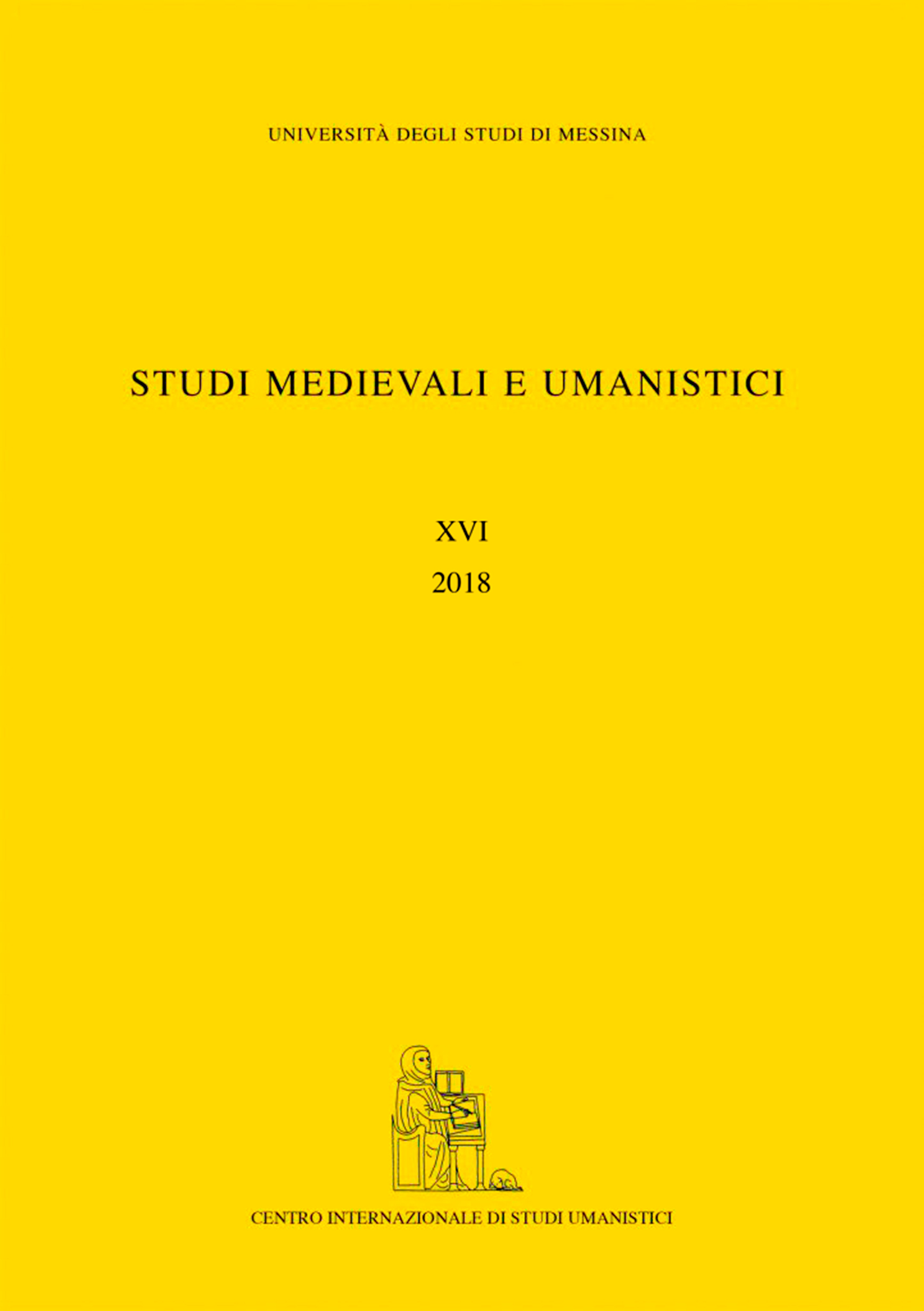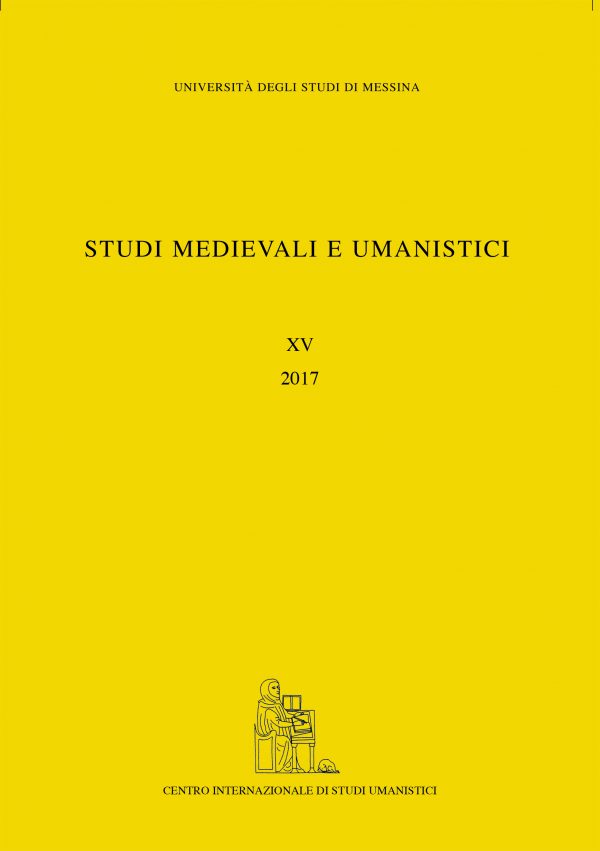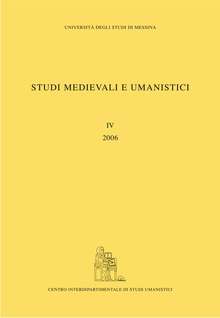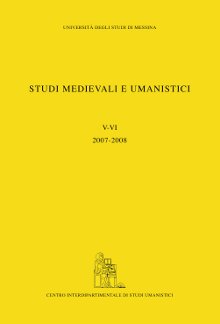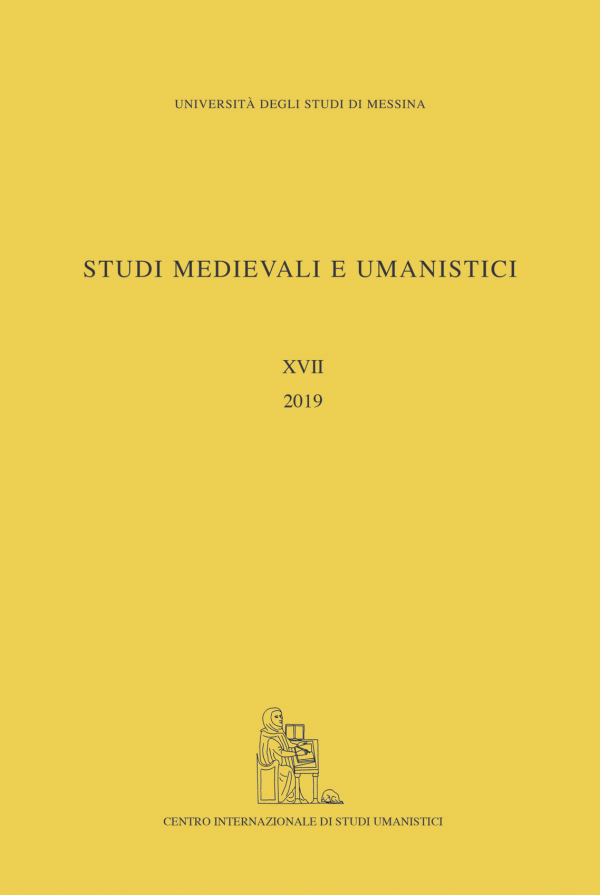Descrizione
XVI (2018)
Messina, Centro Internazionale di Studi Umanistici, 2018, 293 pp., tavv. IV; 25 cm.
ISSN 2035-3774
INDICE GENERALE
Giovanni Cascio, La più antica redazione delle Invective contra medicum: un nuovo testimone
Péter Ertl, Problemi ecdotici ed esegetici in epistole del Petrarca
Valerio Sanzotta, «E Bizantia Florentiam spiritus eius advolavit»: gli Argumenta in decem Platonis dialogos di Marsilio Ficino
Rossella Bianchi, Lo zibaldone poetico dell’umanista ferrarese Daniele Fini (Ferrara, Biblioteca Comunale Ariostea, I 437)
Matteo Stefani, I prolegomeni di Bonaventura Vulcanius alla Ciropedia di Senofonte
TESSERE
F. Forner, Nuove fonti per l’epistolario del cardinale Enea Silvio Piccolomini
S. Pagliaroli, Nuove lettere di Giano Lascari e Giustino Decadio a Francesco II Gonzaga
L. Silvano, Una scheda per Giorgio Valla traduttore (Callimaco, epigr. 23 Pfeiffer)
S. Pagliaroli, Un nuovo autografo di Pietro Bembo
Indice delle tavole
Indice dei manoscritti e delle fonti d’archivio
Indice dei nomi
ABSTRACT
Giovanni Cascio, La più antica redazione delle Invective contra medicum: un nuovo testimone
The subject of the article is a manuscript (Klosterneuburg, Augustiner-Chorherrenstift,
CCl 204 [=K]), which preserves the first redaction of the Invective contra medicum
by Petrarch. Until now, this early version of the tract directed against an
insolent physician, whose identity remains unknown, has been edited on the basis of
one testimony only (Gdańsk, Polska Akademia Nauk Biblioteka Gdańska, Mar. F.
256). The recovery of K not only allows for a more accurate text of the original Invectiva
to be established, but also sheds new light on the complex and manifold redactional
history of the work.
Péter Ertl, Problemi ecdotici ed esegetici in epistole del Petrarca
This article focuses on Petrarch’s collections of prose letters, with the aim of identifying
and analyzing a series of citations and reminiscences in the Liber sine nomine
and the Seniles that are not reported in the current editions of the two works, as well
as proposing an amendment to the text of the critical edition of Sine nomine IX, 8.
Moreover, an error found in the modern translations of Familiares XIII 4, 12 concerning
the identification of the Roman heroes is also corrected.
Valerio Sanzotta, «E Bizantia Florentiam spiritus eius advolavit»: gli Argumenta in decem Platonis dialogos di Marsilio Ficino
Ficino’s translation of Plato represents an unprecedented tipping point in the intellectual
panorama of the XVth century, not only because it brought Plato’s unknown
corpus back to the public, but mainly because Ficino was the first to commit
himself to a comprehensive interpretation of Plato’s text with his argumenta and
full commentaries. After presenting the history of Ficino’s translation of Plato’s
corpus, this contribution focuses on the argumenta to the first ten dialogues translated
for Cosimo de’ Medici in 1464, which are preserved in an autograph manuscript,
now separated in two parts. The hermeneutic tools Ficino used in his
interpretation of Plato are an object of special attention: by analysing the sources
of these argumenta, it is possible to discern how Ficino’s interpretative tools were
already by this time fully formed in their essential structure, not only regarding the
Latin authors, but also the Greek. The reader is also provided with a critical edition
of the first ten argumenta, together with sources and critical apparatus.
Rossella Bianchi, Lo zibaldone poetico dell’umanista ferrarese Daniele Fini (Ferrara, Biblioteca Comunale Ariostea, I 437)
The aim of this paper is to offer an analytical description of the ms. Ferrara, BCA I
437, a voluminous, autograph workbook of the Ferrara humanist Daniele Fini, who
collected in it a large number of his and his humanist friends’ poems during the first
half of the sixteenth century (by 1539). Through the clarification of the collection’s
origin, development, content the A. sheds new light on Fini’s literary profile, as well
as on some aspects and figures of the cultural environment in which he worked.
Matteo Stefani, I prolegomeni di Bonaventura Vulcanius alla Ciropedia di Senofonte
The paper provides the first critical edition of Bonaventura Vulcanius’ prolegomena
to a course on Xenophon’s Cyropaedia taught at Leiden University in 1584. The text
is based on Vulcanius’ autograph in the ms. Leiden, Bibliotheek der Rijksuniversiteit,
Vulc. 9, ff. 42r-44v.
F. ForNEr, Nuove fonti per l’epistolario del cardinale Enea Silvio Piccolomini
The new edition of the letters written by Enea Silvio Piccolomini when he was a
cardinal brings to light a vast correspondence which was not included in the collection
built by his nephews. They, for example, omitted the texts of the correspondence
between him and the Balia of Siena. These letters describe, among other
things, the private interests of the future Pius II, sometimes in contrast with those
of the political elite of his homeland. The letters we publish here, from the Count
Orlov’s manuscript collection, outline part of Goro Lolli’s judicial events, the future
most trusted collaborators of the Pope.
S. PAGLIAroLI, Nuove lettere di Giano Lascari e Giustino Decadio a Francesco
II Gonzaga
This essay provides a first edition of the letters – written in the years 1503, 1505
and 1506 by the Greek humanists Ianus Laskaris and Iustinus Dekadyos – held at
the State Archive of Mantua.
L. SILVANo, Una scheda per Giorgio Valla traduttore (Callimaco, epigr. 23 Pfeiffer)
This article focuses on a Latin translation of Callimachus’ epigram 23 Pf., possibly
the work of Giorgio Valla (1447-1500). The only known copy of it is written on a
leaf inserted in an exemplar of the 1549 Basel edition of the Greek Anthology (ed.
Jean Brodeau) now in the Cornell University Library. The A. provides an edition
of the text and a brief commentary, taking into account other 15th-16th century Latin
translations of the same epigram.
S. PAGLIAroLI, Un nuovo autografo di Pietro Bembo
This essay is a study on the oldest letters written by Pietro Bembo. It also provides
a new analysis of a letter by his father Bernardo (1502), held at the State archive
of Mantua, which the humanist had copied with some spelling peculiarities.

